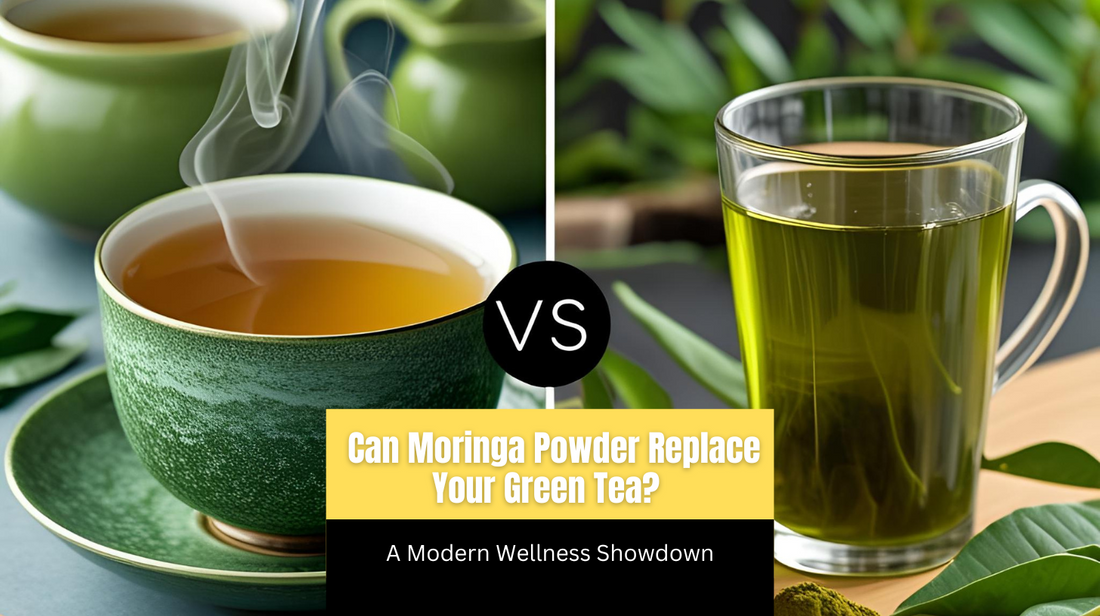
Can Moringa Powder Replace Your Green Tea? A Modern Wellness Showdown
The Battle of the Super Sips
Green tea has long ruled the world of wellness. But lately, a new contender has entered the arena—moringa powder, often dubbed the “miracle tree”. If you’re someone who enjoys green tea from Nepal, you may be wondering: Should I swap my daily cup for moringa? Or can they work side by side in your tea ritual?
Let’s dive into what makes these two health drinks so powerful—and whether moringa powder can really replace your green tea.
What Is Moringa Powder?
Moringa powder is made from the dried leaves of the Moringa oleifera tree, a plant native to South Asia and Africa. It’s often consumed in powdered form—perfect for mixing into smoothies, lattes, or herbal teas like moringa tea.
Key Nutrients in Moringa:
- High in iron, calcium, potassium, and magnesium
-
Contains powerful antioxidants like quercetin and chlorogenic acid
-
Rich in plant protein (great for vegans!)
- Completely caffeine-free
How Green Tea Holds Up
Green tea—especially green tea from Nepal—is a lightly oxidized tea made from Camellia sinensis leaves. It’s cherished for its catechins (like EGCG), l-theanine, and mild caffeine content that promotes focus without the jitters of coffee.
Green Tea Highlights:
- Boosts metabolism and aids weight loss
- Supports brain function and focus
- Rich in EGCG, a cancer-fighting antioxidant
- Can improve heart health and regulate blood sugar
Moringa vs Green Tea: Which One Wins?
Let’s compare them side by side:
|
Category |
Moringa Powder |
Green Tea |
|
Caffeine |
0 mg (caffeine-free) |
~30–50 mg per cup |
|
Protein |
Yes |
No |
|
Iron & Calcium |
High |
Low |
|
EGCG |
No |
Yes |
|
Adaptogen (stress support) |
Yes |
Yes |
|
Skin Health |
Yes |
Yes |
|
Weight Loss |
Indirectly |
Directly |
|
Antioxidants |
High |
High |
|
PCOS & Hormonal Support |
High (especially with Spearmint Tea for PCOS) |
Some |
Should You Replace Green Tea with Moringa Powder?
It depends on your health goals:
- For caffeine-free energy: Moringa is your go-to.
- For hormonal balance or PCOS support: Try moringa with spearmint tea or Sacred Basil Tea (Tulsi).
- For metabolism and weight loss: Stick with green tea—or blend both!
- For clear skin, iron deficiency, or nutrient boost: Moringa wins.
Can You Drink Both?
Absolutely. In fact, blending the two offers complementary benefits. Try this:
Morning Ritual: Green tea for energy and metabolism
Evening Wind-Down: Moringa latte or herbal tea to relax and nourish
Or explore Danfe Tea’s herbal tea collection, which includes caffeine-free blends like Himalayan Moringa Tea, Tulsi Chamomile Tranquility, and more.
How to Use Moringa Powder Daily
- Add 1 tsp to smoothies
- Whisk into warm water for an instant tea
- Sprinkle over oatmeal or yogurt
-
Mix into lattes with oat milk and honey
…it’s clear that health-conscious tea lovers are rethinking their routines. Moringa isn’t here to replace green tea—it’s here to evolve your tea ritual.
Conclusion: Which Superfood Belongs in Your Cup?
Green tea is a classic. Moringa powder is a rising star. The truth? You don’t have to choose. Rotate them based on your mood and needs.
Start your day with green tea from Nepal, and unwind with Himalayan Moringa Tea in the evening. Or explore unique blends like PCOS Power Potion with spearmint tea benefits and sacred basil tea.
🌿 Ready to upgrade your wellness ritual?
Explore our Himalayan Moringa Tea, Green Tea Leaves from Nepal, and unique blends like Spearmint Tea for PCOS at DanfeTea.com.
FAQs
Q: Is moringa tea better than green tea?
A: Not necessarily—it depends on your goals. Moringa is caffeine-free and nutrient-rich, while green tea offers metabolism and focus benefits.
Q: Can I take moringa every day?
A: Yes, 1–2 teaspoons daily is safe and beneficial for most people.
Q: Is moringa good for bloating and digestion?
A: Yes! It supports gut health and works well with herbal tea for digestion like ginger tea or peppermint.










